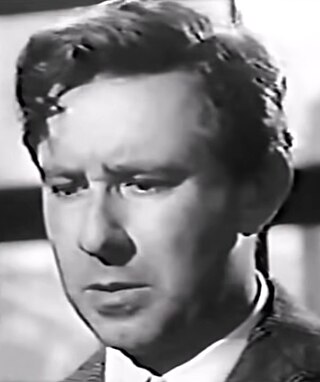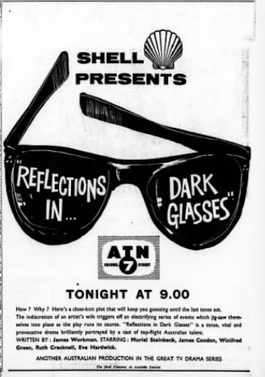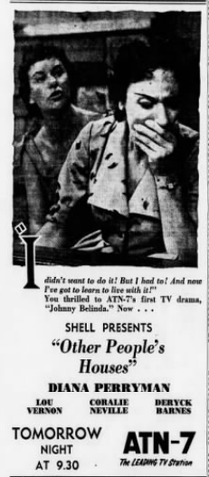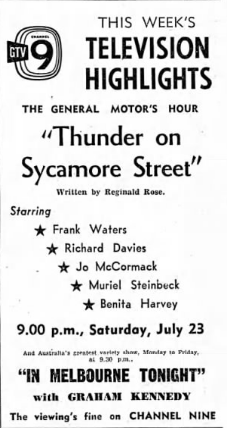
John Meillon was an Australian character actor known for dramatic as well as comedy roles. He portrayed Walter Reilly in the films Crocodile Dundee and Crocodile Dundee II. He also voiced advertisements for Victoria Bitter beer. He appeared in several Australian New Wave films including Wake in Fright and The Cars That Ate Paris.
Autumn Affair is an Australian television soap opera made by and aired by Network Seven station ATN-7, and also shown in Melbourne on Nine Network station GTV-9. Television in Australia had only been broadcasting since 1956 and Seven Network was the first commercial station to make drama a priority.
The Story of Peter Grey was an Australian television daytime soap opera produced by the Seven Network and first broadcast in July 1962. James Condon starred in the title role as a church minister.

Shell Presents was an early attempt at Australian television drama, being an umbrella title for several different productions. It debuted on 4 April 1959, and aired on ATN-7 and GTV-9, who split production of plays for the series between them. It was an anthology series, each program being a self-contained play for television. The series won a Logie award in 1960 for TV Highlight of 1959. As the title suggests, it was sponsored by Shell. It was described as "a very big deal for the station: major institutional sponsorship from international companies for locally produced drama." It would be followed by The General Motors Hour.

"Reflections in Dark Glasses" is an Australian television film, or rather a television play, which aired in 1960. It aired as part of Shell Presents, which consisted of monthly presentations of stand-alone television dramas. It was written by Sydney writer James Workman, and is notable as an early example of Australian-written television drama. It was broadcast live in Sydney on 6 February 1960, then recorded and shown in Melbourne.

"They Were Big, They Were Blue, They Were Beautiful" is an Australian television movie, or rather a live television play, which aired live on 27 June 1959 in Sydney, and on 8 August 1959 in Melbourne. It aired as part of Shell Presents, a monthly presentation of standalone productions which aired from 1959 to 1960 on ATN-7 in Sydney and GTV-9 in Melbourne.

"The Big Day" is an Australian television film, or rather a live television play, which aired in 1959. The fifth episode of the Shell Presents presentations of standalone television dramas, it originally aired 11 July 1959 on Melbourne station GTV-9, a video-tape was made of the broadcast and shown on Sydney station ATN-7 on 25 July 1959.

Rope is a 1957 Australian television film based on the play Rope by Patrick Hamilton. It was presented in real time.

"The Recruiting Officer" is a 1965 Australian television production based on the famous play The Recruiting Officer, which was the first play ever performed in Australia. "The Recruiting Officer" aired on 6 January 1965 in Sydney, 13 January 1965 in Brisbane, and on 20 January 1965 in Melbourne.
"Johnny Belinda" was a 1959 Australian TV adaptation of the 1940 play by Elmer Harris which had been filmed in 1948. It was the first "live" one hour drama on commercial television in Australia.
"Tragedy In A Temporary Town" is a 1959 episode of the Australian anthology drama show Shell Presents starring Michael Pate. It was filmed "live" in Melbourne, then recorded and broadcast in Sydney. It was the third episode of Shell Presents and the first shot in Melbourne. It aired live on 16 May 1959 in Melbourne with a tapped version airing on 30 May 1959 in Sydney.

"Pardon Miss Westcott!" is a 1959 Australian TV play by the Seven Network as part of drama anthology series Shell Presents. It was a musical set in colonial Australia and was broadcast live. It was Australia's first commissioned for television musical comedy. "Pardon Miss Westcott" aired on 12 December 1959 in Sydney and on 19 December 1959 in Melbourne.

"Other People's Houses" is the second episode of the 1959 Australian TV drama anthology Shell Presents. It was based on a play by Tad Mosel and starred Diana Perryman and was directed by David Cahill. It aired on 2 May 1959 in Sydney and on 3 October 1959 in Melbourne.

"A Tongue of Silver" is an episode of the 1959 Australian TV drama anthology Shell Presents. Australian TV drama was relatively rare at the time. It starred John Meillon, who had been in Thunder of Silence in the same series.
Wuthering Heights is a 1959 Australian television play adapted from Emily Brontë's 1847 novel Wuthering Heights. It was directed by Alan Burke and based on a script by Nigel Kneale which had been adapted by the BBC in 1953 as a TV play starring Richard Todd. It was made at a time when Australian drama production was rare.

"Rope" is a 1959 Australian TV play based on the play by Patrick Hamilton. It was part of Shell Presents. It aired on 31 October 1959 in Melbourne, and a tapped version aired on 15 November 1959 in Sydney.

"Ruth" is a 1959 Australian television play. It was presented as part of the Shell Presents program and starred Lyndall Barbour. It was written by John Glennon, an American actor and writer who appeared in the production, and directed by Rod Kinnear. The play aired in Melbourne on 5 September 1959 and in Sydney on 19 September 1959.

"Thunder on Sycamore Street" is a 1960 Australian television play directed by David Cahill. It was based on a script by Reginald Rose. It aired on 23 July 1960 in Melbourne and Sydney.
"The Grey Nurse Said Nothing" is a television play episode from the Australian television series The General Motors Hour. It was produced and directed by David Cahill, and is based on the real life murder of Jim Smith, the so-called Shark Arm case. It was made by Channel Seven who later called "the most ambitious dramatic production ever attempted in Australia... [written by] one of the world's foremost authors of television plays and the cast is Ihe largest ever assembled for an Australian television dramatic production.... the greatest care has been taken to achieve the maximum possible standard in the production of the play which covered a total period of approximately eight weeks." The episode aired on 28 May 1960 in Sydney and Melbourne, and on 11 June 1960 in Brisbane.
"Shadow of a Pale Horse" is a television play that was produced for Australian TV by Sydney station ATN-7, it was also shown in Melbourne on station GTV-9, as this was prior to the creation of the Seven Network and Nine Network. "Shadow of a Pale Horse" aired on 17 September 1960 in Melbourne and Sydney.













